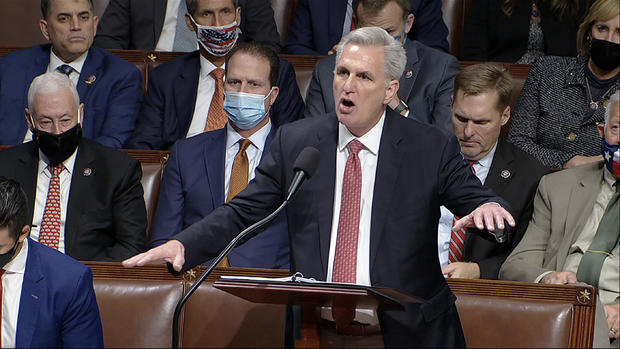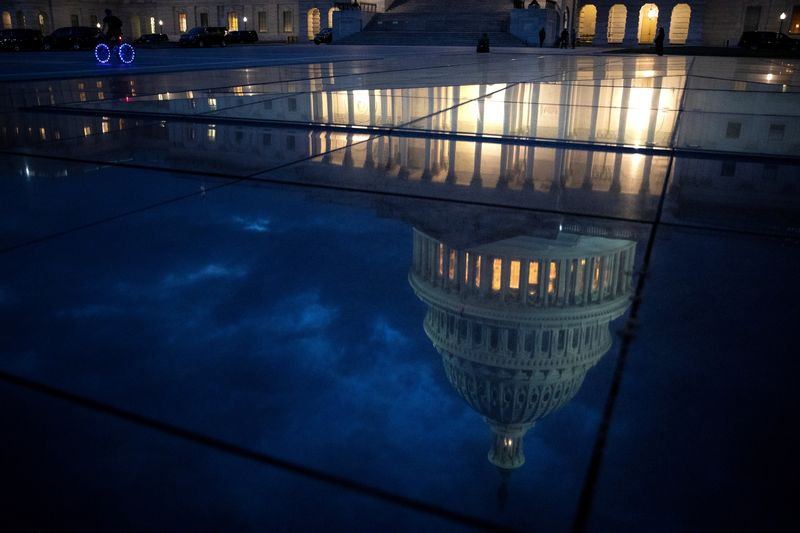The House passed the Build Back Better social spending plan Friday morning, after the vote, which was supposed to take place Thursday night, was delayed by House Minority Leader Kevin McCarthy’s hourslong overnight floor speech. The bill passed 220-213 at 9:46 a.m. Friday, and afterwards, Democrats in the House could be heard chanting, “Nancy, Nancy, Nancy.”
The legislation still faces hurdles in the Senate, where it’s unclear whether moderate Senators Joe Manchin and Kyrsten Sinema will agree to some of the provisions included by the House. In short, the debate over President Biden’s signature plan to expand the social safety net isn’t over yet.
“The Build Back Better Act is fiscally responsible,” Mr. Biden said in a statement. “It reduces the deficit over the long-term. It’s fully paid for by making sure that the wealthiest Americans and biggest corporations begin to pay their fair share in federal taxes. It keeps my commitment that no one earning less than $400,000 a year will pay a penny more in federal taxes. Leading economists and independent experts on Wall Street have confirmed that it will not add to inflationary pressures. Instead, it will boost the capacity of our economy and reduce costs for millions of families.”
McCarthy wrapped up his remarks at 5:10 a.m. Friday, eight hours and thirty-two minutes after he began, eclipsing the eight-hour-seven-minute mark set by Nancy Pelosi in a 2018 speech about the “DACA” program for immigrants. Only a handful of representatives were still in the chamber. The House adjourned a minute later and was to reconvene at 8 a.m. Friday.
Shortly after midnight, House Democratic leaders told members to go home and return Friday morning ror a vote on the bill.
McCarthy’s high-energy speech, featuring a wide variety of attacks on Democrats and Pelosi, the House speaker, capped off a busy evening on Capitol Hill.
The nonpartisan Congressional Budget Office (CBO) released its cost estimate for the bill Thursday. Several moderate Democrats had said they wanted to wait for that score before they voted.
At least two of the moderates who were holding out for the CBO score said Thursday night that they would vote for the bill and another moderate, Congressman Henry Cuellar, of Texas, also indicated he would.
But Democrats’ margin on the measure remained razor-thin. Representative Jared Golden, of Maine, was still expressing reservations and, with the Democrats’ slim majority, they could only afford to lose three votes, since no Republicans were expected to support the bill.
The CBO said it would increase the deficit by more than $367 billion over 10 years. But the estimate did not include the revenue that could be generated from increasing IRS enforcement, which the CBO suggested would be $207 billion.
Treasury Secretary Janet Yellen welcomed the CBO’s analysis. Noting that the Treasury Department estimates that the crackdown on tax evaders would raise $400 billion, she said in a statement that the combined CBO score, Joint Committee on Taxation estimates and her own department’s analysis “make it clear that Build Back Better is fully paid for, and in fact will reduce our nation’s debt over time by generating more than $2 trillion through reforms that ask the wealthiest Americans and large corporations to pay their fair share.”
The CBO has been releasing estimates on individual components of the Build Back Better Act over the past few weeks, but did not address how much money the legislation would raise, or its cost, until Thursday.
Overall, the CBO estimates the legislation would result in spending $1.63 trillion. The office said changes to the tax code and other provisions would generate more than $1.26 trillion in revenue and suggested increased IRS enforcement would add $207 billion in revenue.
Some of the CBO figures have come in lower than Biden administration estimates. The cost of universal pre-K and affordable child care would be roughly $382 billion, the agency found, compared to the bill’s line item figure of $400 billion. Prescription drug reforms would save nearly $300 billion — $50 billion more than the White House estimated. Other estimates were closer: Both put affordable housing-related costs at roughly $150 billion. And the CBO said expanding Medicare to include hearing would cost $36 billion, while the White House said it would be $35 billion.
The CBO also estimated that a four-week paid leave included in the House version of the bill would cost $205 billion. That provision was not included in the revised White House framework because paid leave had been dropped from the bill but was later partially restored by lawmakers.
The White House, which estimated its framework would cost $1.75 trillion, claims it would reduce the deficit over time, generating more than $2.1 trillion over 10 years.
After the House vote on Build Back Better, the bill will head over to the Senate, where the Democrats’ 50-seat majority will surely lead to more changes.
Jack Turman and Brian Dakss contributed to this report.


